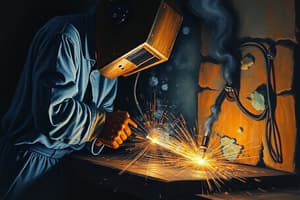Podcast
Questions and Answers
What is the primary characteristic of self secured joints?
What is the primary characteristic of self secured joints?
- They can be used for any thickness of materials.
- They are formed by melting the edges of materials.
- They require a filler material.
- They are created by folding and interlocking sheet edges. (correct)
Which of the following welding methods involves the melting of the base metal?
Which of the following welding methods involves the melting of the base metal?
- Diffusion welding
- Solid state welding
- Arc welding (correct)
- Friction welding
What distinguishes fusion welding from solid state welding?
What distinguishes fusion welding from solid state welding?
- Fusion welding requires a filler material, while solid state welding does not. (correct)
- Fusion welding takes place at room temperature, while solid state welding requires heat.
- Solid state welding uses extreme heat, while fusion welding does not.
- Solid state welding is less effective than fusion welding.
Which of the following is NOT an application of welding?
Which of the following is NOT an application of welding?
What does the weld pool consist of during the welding process?
What does the weld pool consist of during the welding process?
What is the primary function of a screw in fastening?
What is the primary function of a screw in fastening?
Which type of washer is specifically designed to resist loosening of a bolt or screw?
Which type of washer is specifically designed to resist loosening of a bolt or screw?
What distinguishes a stud from a bolt?
What distinguishes a stud from a bolt?
What is the main characteristic of adhesive bonding?
What is the main characteristic of adhesive bonding?
At what temperature does solder generally melt?
At what temperature does solder generally melt?
In brazing, what is the typical melting temperature of the filler metal used?
In brazing, what is the typical melting temperature of the filler metal used?
Which type of screw is used primarily for fastening collars and gears to shafts?
Which type of screw is used primarily for fastening collars and gears to shafts?
What is one disadvantage of adhesive bonding compared to welding, brazing, or soldering?
What is one disadvantage of adhesive bonding compared to welding, brazing, or soldering?
What is metal joining primarily defined as?
What is metal joining primarily defined as?
Which of the following is NOT a reason for using joining processes in manufacturing?
Which of the following is NOT a reason for using joining processes in manufacturing?
What type of joint is created when using a rivet?
What type of joint is created when using a rivet?
Which of the following is a major type of mechanical fastening?
Which of the following is a major type of mechanical fastening?
What is the primary function of a bolt in a screwed joint?
What is the primary function of a bolt in a screwed joint?
Which type of riveted joint involves two strips of material?
Which type of riveted joint involves two strips of material?
What distinguishes a screwed joint from a riveted joint?
What distinguishes a screwed joint from a riveted joint?
Which of the following best describes a rivet?
Which of the following best describes a rivet?
What is the primary energy source used in arc welding processes?
What is the primary energy source used in arc welding processes?
Which welding process primarily uses a combination of fuel gases and oxygen?
Which welding process primarily uses a combination of fuel gases and oxygen?
What is a key characteristic of solid state welding?
What is a key characteristic of solid state welding?
Which of the following processes is a form of resistance welding?
Which of the following processes is a form of resistance welding?
How is heat generated in resistance welding?
How is heat generated in resistance welding?
Which welding technique does NOT require the melting of the materials being joined?
Which welding technique does NOT require the melting of the materials being joined?
What defines the process of gas welding?
What defines the process of gas welding?
Which of the following welding processes is primarily classified as arc welding?
Which of the following welding processes is primarily classified as arc welding?
Flashcards
Metal Joining
Metal Joining
The process of joining two metal parts together, either temporarily or permanently, with or without heat or pressure.
Materials Joining Methods
Materials Joining Methods
Methods used to join materials together, including mechanical fastening, welding, brazing, and soldering.
Riveted Joints
Riveted Joints
A type of mechanical joint where a cylindrical bar with a head (rivet) is used to join two pieces of metal by inserting it through holes and then hammering the tail over.
Screwed Joints
Screwed Joints
Signup and view all the flashcards
Why are Joining Processes Important?
Why are Joining Processes Important?
Signup and view all the flashcards
Shielded Metal Arc Welding (SMAW)
Shielded Metal Arc Welding (SMAW)
Signup and view all the flashcards
Welding Defects
Welding Defects
Signup and view all the flashcards
Welding Terminology
Welding Terminology
Signup and view all the flashcards
Welding
Welding
Signup and view all the flashcards
Fusion Welding
Fusion Welding
Signup and view all the flashcards
Solid State Welding
Solid State Welding
Signup and view all the flashcards
Arc Welding
Arc Welding
Signup and view all the flashcards
Welding Applications
Welding Applications
Signup and view all the flashcards
Screw
Screw
Signup and view all the flashcards
Stud
Stud
Signup and view all the flashcards
Nut
Nut
Signup and view all the flashcards
Self-Tapping Screw
Self-Tapping Screw
Signup and view all the flashcards
Thread-Forming Screw
Thread-Forming Screw
Signup and view all the flashcards
Thread-Cutting Screw
Thread-Cutting Screw
Signup and view all the flashcards
Set Screw
Set Screw
Signup and view all the flashcards
Washer
Washer
Signup and view all the flashcards
Resistance Welding
Resistance Welding
Signup and view all the flashcards
Oxyacetylene Welding
Oxyacetylene Welding
Signup and view all the flashcards
Spot Welding
Spot Welding
Signup and view all the flashcards
Study Notes
Production Technology - Lecture 2: Joining Processes
- Material joining is the process of joining two metal parts, either temporarily or permanently, with or without heat or pressure.
- Key joining methods include mechanical fastening, adhesive bonding, welding, soldering, brazing, and self-secured joints.
- Mechanical fastening, is a process for creating either temporary or permanent joints.
- Two major types of mechanical assembly exist: -Allowing for disassembly using a third-party component -Creating a permanent joint with no possibility for disassembly
- Types of mechanical fastening include riveted and screwed joints.
- Riveted joints are permanent fastenings used in structural work.
- A rivet is a cylindrical bar with a head integral to it.
- The portion of the rivet is called the shank or body (lower portion called tail)
- Riveted joints are used in structural work, ship building, bridges, tanks, and boiler shells.
- They are widely used for joining light metals.
- Common rivet types include solid, tubular, semi-tubular, bifurcated, and compression rivets.
- Screwed joints are widely used in machines where parts need to be connected or disconnected easily without damage.
- A screwed joint is composed of bolt and nut.
- Common threaded fastener types include bolts, screws, studs, and nuts.
- Bolts have an external thread and require a nut to be inserted into holes in the parts.
- Screws are externally threaded fasteners that are inserted into a blind threaded hole and require no nut.
- Studs are externally threaded fasteners without a head, while nuts are internally threaded for connecting.
- Set screws are used to fasten collars, gears, and pulleys to shafts. -Washer types include plain (flat), spring, lock, and split lock washers. These play roles in dampening vibrations, preventing loosening of bolts/screws, and providing tension.
- Adhesive bonding uses a filler material to join closely spaced parts via surface attachment.
- It's used with similar and dissimilar materials like metals, plastics, ceramics, wood, and paper.
- Adhesive joints are typically weaker than welded, brazed, or soldered joints.
- Soldering joins metal parts by heating and running a low-melting-point alloy (usually tin & lead).
- Soldering alloys melt at temperatures below 300°C to prevent damage to base metals.
- This produces a lower-strength joint compared to other types.
- Brazing involves heating base metal to red-hot and filling the gap with molten metal (melting temperature above 450°C but below base metal`s melting point) to form a permanent joint.
- Filler metals for brazing are often copper alloys (Cu-Zn and Cu-Ag).
- These alloys form alloys with iron and have high strength.
- Self-secured joints involve folding and interlocking thin sheet edges to create secure attachments without additional joining processes.
- Typically used for light-gauge sheet metal fabrications less than 1.6 mm thick.
- Welding is a fabrication process joining materials (usually metals or thermoplastics) through melting the joining interface.
- A filler material may be added to the molten pool to form a strong weld.
- Welding process classification is based on the source of energy.
- Types include gas welding (using fuel gases and oxygen), arc welding (using electric arc), resistance welding (heat generation via current flow), solid-state welding, thermo-chemical welding, and radiant (laser or electron beam) energy welding.
- Welding applications are extensive, including automotive bodies, aircraft frames, railway wagons, machine frames, submarines, storage tanks, oil/gas pipelines, boilers, pressure vessels, bridges, ship building, and machinery repair.
Studying That Suits You
Use AI to generate personalized quizzes and flashcards to suit your learning preferences.




